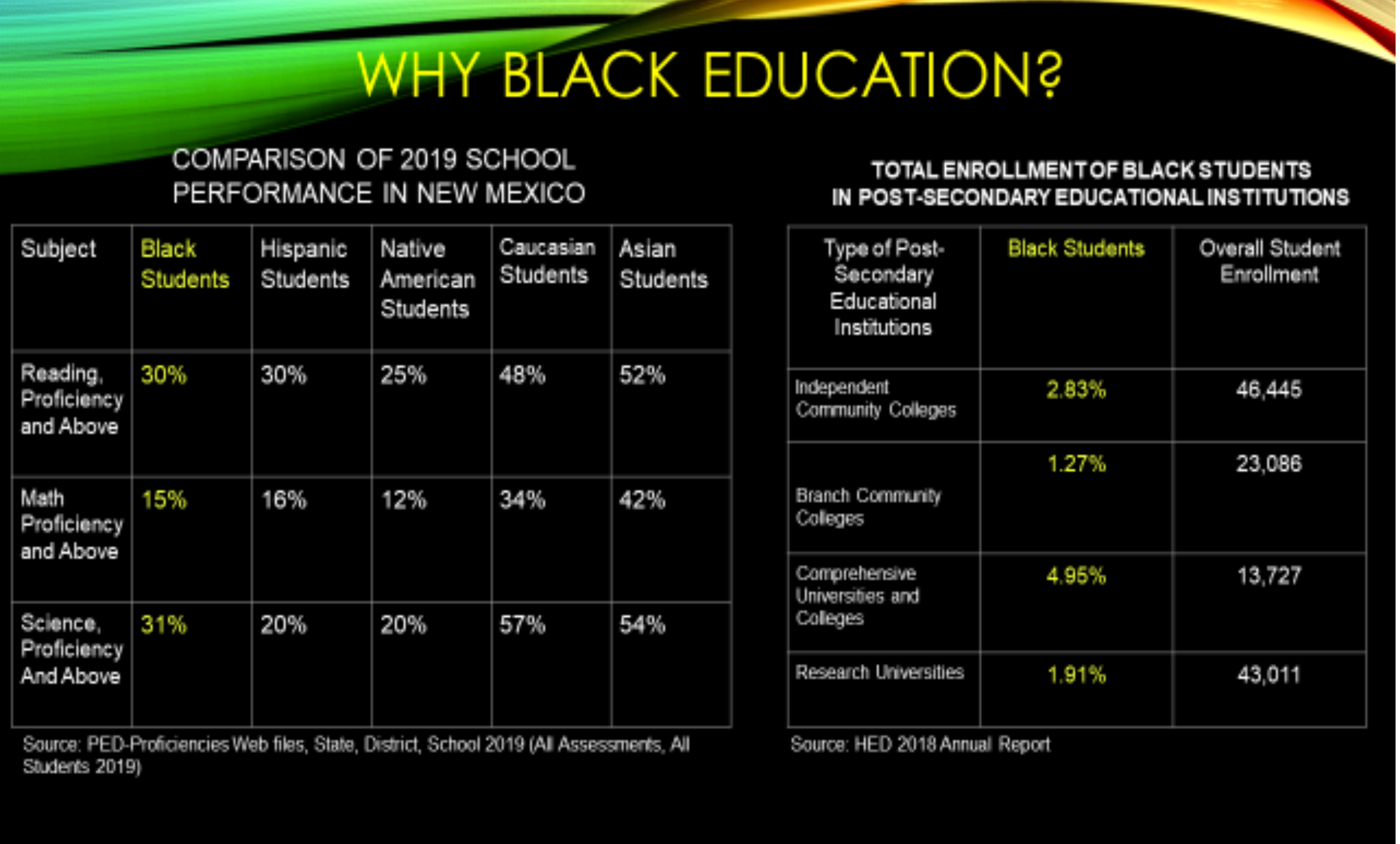Why Does New Mexico Need a ‘Black Education Act’?
By Vickie C. Bannerman, Ed.D. | Deputy Secretary: Identity, Equity and Transformation, New Mexico Public Education Department

“We can’t begin to dismantle a racist system if we don’t first agree that such a system exists.”
I have received equal parts praise and push back regarding the Black Education Act (House Bill 43), recently signed into statute. You would think that anything that insists on diversity, inclusion, accurate representation, and equitable access would be wildly and widely celebrated. In this case, you would be wrong. At least in part.
In the article The Future of Black Education, Future Focused looked through the lens of African American leaders in New Mexico working to dismantle the racist system. In follow-up, I would like to offer that we can’t begin to dismantle a racist system if we don’t first agree that such a system exists. There is a very real lack of such agreement in New Mexico. How do I know? Let’s begin with the “Tri-Cultural Myth”.
What’s Wrong with the Tri-Cultural Myth?
Journalist Brian Metzger describes in New Mexico In Depth, “In popular mythology, New Mexico is a 'tricultural' state — one where Hispanic, Anglo, and Native American communities live in relative harmony.”
The idea that these three cultures coexist in harmony is quite mythical. Additionally, and very importantly, it only acknowledges three cultures as part of the state's heritage. Black New Mexicans are completely erased.
The existence of Africans on these enchanted lands dates as far back as 1539 (Martinez, 2021). And consider the following 2019 U.S. Census Bureau population data:

Just this morning I woke up as a Black woman living in New Mexico. My husband and son both woke up this morning as Black men in New Mexico. The same is true for a host of others descending from African, Asian, Hawaiian, and Pacific Island origins. We all woke this morning, in the skin we are in, all living in New Mexico. Why aren’t we included in the story?
Our state is home to a myriad of cultures that deserve to be recognized, celebrated, respected, and accepted. Until this happens, many students will continue to be underserved, under-resourced, and under-represented across the state. This is especially urgent in our schools.
Why Focus on Black Education?
There are some who still ask the question “Why do we need a Black Education Act?” There are educators among us who quietly ask “Why focus on Black education when there are so few, if any, Black kids in my school?” The mere fact that such questions are being asked points directly to a gaping deficit in what and how we teach. Thankfully, not all educators share this sentiment, and many understand that an inclusive, diverse, accurate education benefits all children. For those who aren’t quite there yet, please consider the following:
Imagine living in a state that boasts a history that actively and insistently excludes entire cultures. Imagine what learning looks like in a state that overtly minimizes, modifies, or erases the intersectionality that should connect us rather than divide us. Imagine listening to adults argue against anti-racist practices out of fear that the local majority may feel victimized as a result. Imagine feeling victimized, dehumanized, lied to, and damaged at school.
Black students don’t have to imagine this. They live this every day.
What Do the Numbers Tell Us?
Black, Hispanic, and Native American students are consistently the lowest achieving groups in the state. Black students are among the lowest percentage of students enrolled in colleges and universities. This does not even address the percentage of Black students who don’t graduate once enrolled. The Black Education Act, like all education acts in the state, exists to identify and actively remove barriers that hinder achievement. Statute language mandates the following in efforts to do so:
- Establish an advisory council
- Hire a Black Education Liaison at NMPED
- Prepare white papers presenting current research regarding improving education for Black students
- Establish a cooperative relationship with Higher Education Department and post-secondary schools in the state
- Prepare and submit annual PreK –Postsecondary state-wide Black education status report
- Develop district policies that address and consequence racially motivated incidents
- Annual anti-racism and racial sensitivity training or professional development for all school staff
- Develop of a hotline for use to report instances of racism directly to NMPED
Although the Black Education Act was created to directly support improvements in education for Black students, the statute language includes tools to support all children including the hotline, mandatory anti-racism training, and district policies to combat racially charged behaviors in schools.
Time to Take Action
Even with this statute in place, without action the Act means nothing. My challenge to myself and to all others is to take action. We saw something, we said something, now is the time to do something. Let’s do more than just imagine. Let’s stand together as champions for Black children and all children in the state of New Mexico.
Education leader Rita Pierson said it best when she proclaimed, “Every child deserves a champion: an adult who will never give up on them, who understands the power of connection, and insists that they become the best they can possibly be. Is this job tough? You bet-cha. But it is not impossible. We can do this. We’re educators. We’re born to make a difference.”
Learn more about how the NM Public Education Department and Future Focused are prioritizing anti-racism in the new 2021 Equity Report:


Dr. Vickie C. Bannerman is the Public Education Department’s Deputy Secretary of Identity, Equity and Transformation. In this role, Dr. Bannerman oversees and supports Options for Families/Charter Schools Division, Indian Education Division, Language and Culture Division and Special Education Division.
She also oversees improvement and implementation of the Indian Education Act, Hispanic Education Act, Bilingual Multicultural Education Act, Individuals with Disabilities Education Act and the recent House Bill 43: Black Education Act.



Comments
The Black Education Act & article is SO necessary. Thank you for your leadership Dr. Bannerman.
Thanks Dr. Bannerman for all you do.